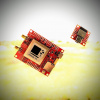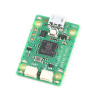×
SparkFun will be closed on Tuesday, December 24th, and Wednesday, December 25th, in observance of the Christmas holiday. Any orders qualifying for same day shipping placed after 2:00 p.m. (MST) on Monday, December 23rd, will be processed on Thursday, December 26th, when we return to regular business hours. Wishing you a safe and happy holiday from all of us at SparkFun!
Please note - we will not be available for Local Pick up orders from December 24th-December 27th. If you place an order for Local Pick-Up we will have those ready on Monday, December 30th.
A few months ago, we looked at setting up a headless Raspberry Pi. While Serial or SSH is my go-to method for interacting with a Pi, what if you need access to the graphical desktop? For example, you might need to create a user interface that relies on the X server, or you want to access an API that requires opening a browser for authentication.
If you still want to eschew the monitor, keyboard and mouse, I won't blame you: they can easily triple the cost of a Raspberry Pi setup. To get a remote desktop across your network (or better, across the internet!), you can turn to VNC. Luckily, modern versions of Raspbian come pre-installed with RealVNC, which lets you control your Pi's desktop from another computer.
While enabling VNC on your Pi is relatively straightforward, it can be a tad tricky if you have a full headless setup. In the following tutorial, we show how to set up remote desktop with RealVNC using the command line as well as how to use RealVNC's Cloud Connection to control your Pi over the Internet.
How to Use Remote Desktop on the Raspberry Pi with VNC
July 9, 2018
Use RealVNC to connect to your Raspberry Pi to control the graphical desktop remotely across the network.
If you really want to take remote computing to the next level with your Raspberry Pi, user jma89 pointed out that the Pi now supports network booting. The sad news is that the Pi versions 1 B+ and 2 B still require an SD card to enable netboot.







